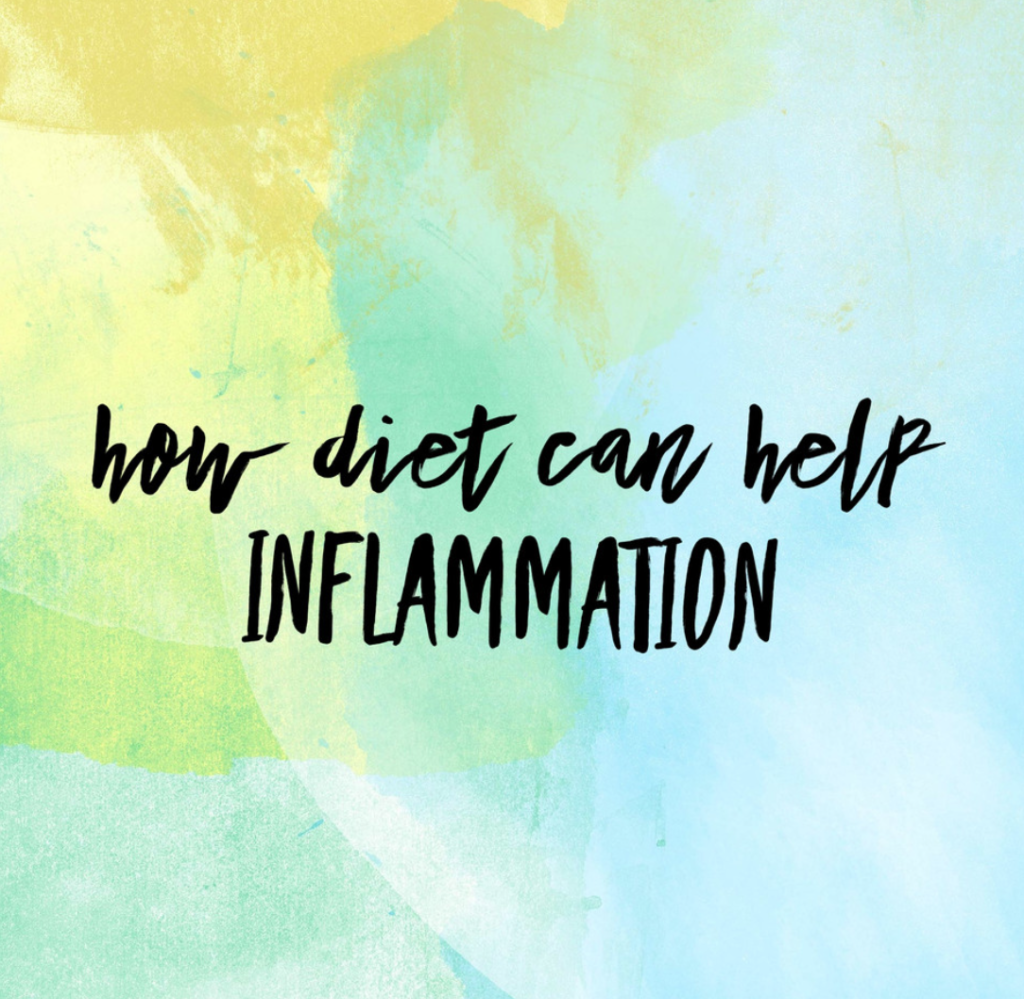Thankyou to Naomi Leppitt, Community dietitian for her help with this post.
Inflammation in the body is a natural and normal response to injury or illness, like when you get a cut, or catch a cold. It’s your body’s defence system and is part of the healing process.
Sometimes though, people can have inflammation for a long time, like in arthritis, asthma and eczema, some heart or lung diseases, diabetes and some cancers. Other inflammatory conditions include IBS, IBD and coeliac disease which affect the gut.
Depending on which inflammatory condition you experience, your doctor will provide recommendations for treatment and may refer you to a dietitian where dietary changes could improve symptoms.

Specific nutrients like Zinc, Selenium and vitamin C give your immune system a boost. But rather than taking individual supplements, aim for your 5-a-day of fruits and vegetables. Research shows having enough fruits and veg per day could reduce risk of inflammatory conditions such as heart disease and cancer.
Having a small handful of nuts regularly (28g) is shown to help reduce risk of lung diseases, diabetes and infections as well as heart disease and cancer. So next time you fancy a snack, reach for some mixed nuts, or add as a topper to salads or yoghurt.
Oily fish like salmon, mackerel and sardines contain omega-3 fatty acids, which are proven for their anti-inflammatory properties (Maroon, 2010). Though you can take omega 3’s as supplements, the studies show greater benefit from eating the whole fish. We are recommended to have 2 portions of fish a week, one of which should be oily.
Certain herbs can have anti-inflammatory properties, including ginger, turmeric, and chilli so you could experiment with these in your cooking. Be aware you often need to have large amounts of these to get the effects, but every little helps.
Probiotics may help to reduce the likelihood of catching a cold, and may boost the effectiveness of the flu vaccine when taken everyday both before and after the day it’s received. Though more studies are needed to confirm which specific probiotics are effective, they’re, considered safe to take for healthy adults so you may find they help. It is tricky to know which is the best one to take, so try a good all purpose one. Or you could include more fermented foods in your diet like kimchi and sauerkraut.
There are various herbal supplements that are known for anti- inflammatory properties, but be aware some herbs can interact with other medications, so it is always key to seek advice from a qualified professional.
An overall healthy balanced diet of fruits, vegetables, nuts, seeds and wholegrain will provide you with micronutrients and antioxidants to keep your body ready to fight off disease.
And of course, with the busy and often stressful lives we have, it’s important to prioritise your own wellbeing. Quitting smoking, regular exercise, relaxation and enough sleep all help your body’s immune system to function at its best.
Sources
Adib Rad H, Basirat Z, Bakouei F, et al. Effect of Ginger and Novafen on menstrual pain: A cross-over trial. Taiwan J Obstet Gynecol. 2018;57(6):806-809. doi:10.1016/j.tjog.2018.10.006
Aune D, Giovannucci E, Boffetta P, Fadnes LT, Keum N, Norat T, Greenwood DC, Riboli E, Vatten LJ, Tonstad S. Fruit and vegetable intake and the risk of cardiovascular disease, total cancer and all-cause mortality-a systematic review and dose-response meta-analysis of prospective studies. Int J Epidemiol. 2017 Jun 1;46(3):1029-1056. doi: 10.1093/ije/dyw319. PMID: 28338764; PMCID: PMC5837313.
Aune D, Keum N, Giovannucci E, Fadnes LT, Boffetta P, Greenwood DC, Tonstad S, Vatten LJ, Riboli E, Norat T. Nut consumption and risk of cardiovascular disease, total cancer, all-cause and cause-specific mortality: a systematic review and dose-response meta-analysis of prospective studies. BMC Med. 2016 Dec 5;14(1):207. doi: 10.1186/s12916-016-0730-3. PMID: 27916000; PMCID: PMC5137221.
Maroon, Joseph C et al. “Natural anti-inflammatory agents for pain relief.” Surgical neurology international vol. 1 80. 13 Dec. 2010, doi:10.4103/2152-7806.73804
Prasad A, 2014, Zinc is an antioxidant and anti-inflammatory agent: its role in human health. Front Nutr. https://doi.org/10.3389/fnut.2014.00014
Srivastava, S et al. “Curcuma longa extract reduces inflammatory and oxidative stress biomarkers in osteoarthritis of knee: a four-month, double-blind, randomized, placebo-controlled trial.” Inflammopharmacology vol. 24,6 (2016): 377-388. doi:10.1007/s10787-016-0289-9
Thota RN, Acharya SH, Garg ML. Curcumin and/or omega-3 polyunsaturated fatty acids supplementation reduces insulin resistance and blood lipids in individuals with high risk of type 2 diabetes: a randomised controlled trial. Lipids Health Dis. 2019;18(1):31. Published 2019 Jan 26. doi:10.1186/s12944-019-0967-x
https://www.bda.uk.com/resource/rheumatoid-arthritis-diet.html